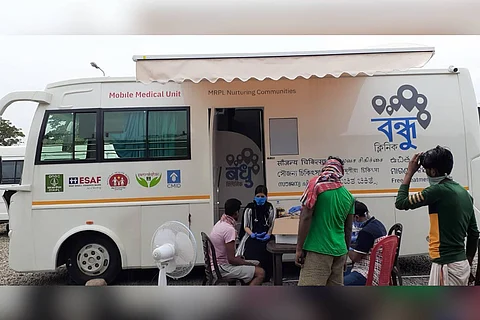

At 8 or 9 in the morning, a big white bus begins its ride through the roads of Ernakulam district, to reach sites or colonies where migrant labourers live. Inside the vehicle is a doctor, a nurse, a clinical assistant who doubles as a driver and a programme director. They stop at sites or camps where migrant workers work or stay, and begin screening them for any sort of medical issues. If they have symptoms associated with COVID-19 – fever, cough, throat pain or breathing trouble – the nearest Public Healthcare Centre (PHC) is immediately alerted.
‘Bandhu Clinic’ – an initiative of the National Health Mission Ernakulam and the Centre for Migration and Inclusive Development (CMID) – has been in service since March 28, when the country was six days into the nationwide lockdown to fight the spread of COVID-19.
“It is an idea that was developing much before the coronavirus threat had begun. We have been interested in social work and especially in the area of migration. We started CMID as a nonprofit organisation to make healthcare accessible to migrant workers. It just so happened that by the time we brought out the customised vehicle (with the help of Mangalore Refinery and Petro Chemicals) that could work as a mobile clinic, COVID-19 had spread all over the world,” says Benoy Peter, executive director of CMID.
ESAF Small Finance Bank agreed to support the operations. And the unit came to be called Bandhu, which is the Bengal word for buddy, since 40 percent of the migrant labourers in Ernakulam are from Bengal.
Time, location and language
There are 35 lakh migrant workers in Kerala and they don’t have access to healthcare because of time, location and language, Benoy says. “Public health centres work the same time as migrant labourers do. The labourers wouldn’t want to take leave, lose a day’s wages and go to a healthcare service. Location is another issue. The third problem is language. In crowded PHCs, the doctor may get just a few minutes with each patient and the labourer may not even grasp how many times s/he is to take a medicine. But chances are that s/he may not even go, leaving their job, unless their condition is that bad.”
What they do instead, Benoy says, is to approach a nearby medical store. If they have a cough, they just get a cough syrup. But it might be tuberculosis, and the people with whom they share a room might get it from them. There are several such health hazards in the lives of migrant labourers, Benoy says.
With a mobile clinic, they hoped to address all of these issues. This way, healthcare could be taken to the migrant labourers where they worked, saving them time and travel. They have also recruited a team that understands and speaks multiple languages.
“The doctor in the team – Thasleema Beevi – speaks Kannada and Malayalam, the nurse – Gireesh – speaks Hindi and Bhojpuri, the clinical assistant - Binu MP – also speaks Hindi. Once we begin our regular service (post COVID-19), the clinic will run from 1.30 to 9.30 pm, and apart from examining them for various health issues, we will also provide health education. There is a doctor’s consulting room and a nurse station inside. Now, however, since we need to maintain social distancing, the inside of the bus is not used. Instead, a table is pulled out of the van and the doctor consults the people outside,” Benoy adds.
While the mobile clinic is run by CMID, the sites they stop at are hosted by the NHM.
Dr Akhil of NHM, Ernakulam, explains why a mobile unit is necessary. “The regular camps we put up for migrant labourers needn't be followed up. But here, any difficulties are reported to the PHCs who then follow it up with them. Mobile clinics have always been in our ideas for migrant labourers – the project is called Aditi Devobhava. We have trained 11 migrant labourers in health work so that information can be disseminated through them. They let the others know,” he says.
2819 people screened so far, no COVID-19 cases
Shafeena, the programme director who accompanies the medical team, says that once they reach a site or colony, they ask everyone with any sort of discomfort to approach the clinic. “We have screened 2819 people so far and covered 45 sites in Ernakulam district. Out of these, 68 people have been found to have fever,” she says.
If they show any symptoms, their details and contact information are passed on to the Health Department who will then follow up with them.
“So far, there has been no suspected case of COVID-19,” Shafeena says.
It’s mostly skin rashes caused by cement allergy or else back pain, for which medicines are given for free. Bandhu clinic also gives them awareness about COVID-19. “Now, with the police going to camps to talk to them, they are all mostly aware of the disease. They ask some questions about the lockdown but they understand the need for social distancing,” Shafeena adds.
The clinic is now running as a pilot project and as a demonstration for the NHM, Benoy says, so it can then be replicated in several places across the country.